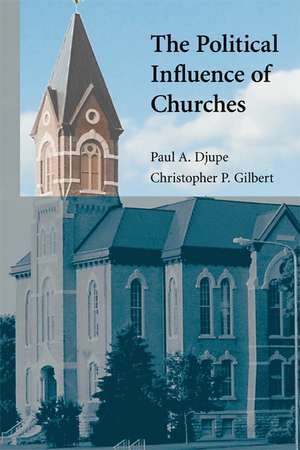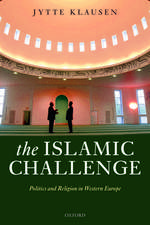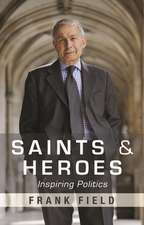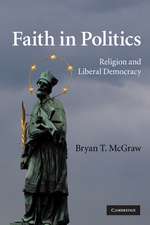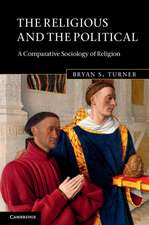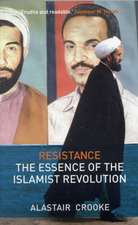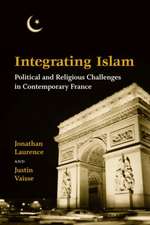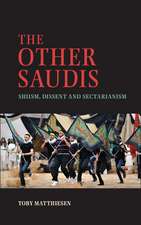The Political Influence of Churches: Cambridge Studies in Social Theory, Religion and Politics
Autor Paul A. Djupe, Christopher P. Gilberten Limba Engleză Paperback – 14 dec 2008
| Toate formatele și edițiile | Preț | Express |
|---|---|---|
| Paperback (1) | 230.51 lei 6-8 săpt. | |
| Cambridge University Press – 14 dec 2008 | 230.51 lei 6-8 săpt. | |
| Hardback (1) | 445.66 lei 6-8 săpt. | |
| Cambridge University Press – 14 dec 2008 | 445.66 lei 6-8 săpt. |
Din seria Cambridge Studies in Social Theory, Religion and Politics
- 11%
 Preț: 689.78 lei
Preț: 689.78 lei -
 Preț: 203.50 lei
Preț: 203.50 lei -
 Preț: 155.84 lei
Preț: 155.84 lei -
 Preț: 230.33 lei
Preț: 230.33 lei -
 Preț: 176.86 lei
Preț: 176.86 lei -
 Preț: 234.23 lei
Preț: 234.23 lei -
 Preț: 237.74 lei
Preț: 237.74 lei -
 Preț: 160.22 lei
Preț: 160.22 lei -
 Preț: 284.78 lei
Preț: 284.78 lei -
 Preț: 250.30 lei
Preț: 250.30 lei -
 Preț: 327.30 lei
Preț: 327.30 lei -
 Preț: 201.59 lei
Preț: 201.59 lei -
 Preț: 283.03 lei
Preț: 283.03 lei -
 Preț: 286.89 lei
Preț: 286.89 lei -
 Preț: 225.20 lei
Preț: 225.20 lei -
 Preț: 263.79 lei
Preț: 263.79 lei - 14%
 Preț: 686.73 lei
Preț: 686.73 lei -
 Preț: 223.29 lei
Preț: 223.29 lei - 11%
 Preț: 560.27 lei
Preț: 560.27 lei -
 Preț: 286.89 lei
Preț: 286.89 lei -
 Preț: 203.50 lei
Preț: 203.50 lei -
 Preț: 200.61 lei
Preț: 200.61 lei -
 Preț: 231.47 lei
Preț: 231.47 lei -
 Preț: 281.30 lei
Preț: 281.30 lei -
 Preț: 292.67 lei
Preț: 292.67 lei -
 Preț: 275.85 lei
Preț: 275.85 lei - 14%
 Preț: 697.95 lei
Preț: 697.95 lei
Preț: 230.51 lei
Nou
Puncte Express: 346
Preț estimativ în valută:
44.11€ • 46.17$ • 36.71£
44.11€ • 46.17$ • 36.71£
Carte tipărită la comandă
Livrare economică 31 martie-14 aprilie
Preluare comenzi: 021 569.72.76
Specificații
ISBN-13: 9780521692199
ISBN-10: 0521692199
Pagini: 294
Ilustrații: 44 tables
Dimensiuni: 153 x 228 x 16 mm
Greutate: 0.41 kg
Ediția:1
Editura: Cambridge University Press
Colecția Cambridge University Press
Seria Cambridge Studies in Social Theory, Religion and Politics
Locul publicării:New York, United States
ISBN-10: 0521692199
Pagini: 294
Ilustrații: 44 tables
Dimensiuni: 153 x 228 x 16 mm
Greutate: 0.41 kg
Ediția:1
Editura: Cambridge University Press
Colecția Cambridge University Press
Seria Cambridge Studies in Social Theory, Religion and Politics
Locul publicării:New York, United States
Notă biografică
Cuprins
Recenzii
'Djupe and Gilbert have written an important book on the impact of religion on the politics of individual church members. Rather than viewing religion from afar - as another characteristic held by individuals or another organization to which some individuals belong - they look at it from the inside. They consider the structure of life in churches, and the networks of relationships that connect church members to each other and to the world outside the church. This produces a very sophisticated treatment of the contingent circumstances under which churches make a difference in the politics of church members. By giving primary attention to the patterns of social interaction and communication within churches, the authors produce a masterful analysis that is reminiscent of the classical treatment given to labor union politics by Lipset, Trow, and Coleman in Union Democracy. Political science needs more studies like this one.' Robert Huckfeldt, University of California, Davis
'The Political Influence of Churches will be a genuinely seminal book. Djupe and Gilbert combine sophisticated theoretical understandings of religion and of group dynamics with an ambitious research design and resourceful data analysis. The authors' emphasis on the complex social interactions which take place within congregations will change the way in which we think about political learning in religious settings, and will affect future research in religion and politics for years to come.' Ted G. Jelen, University of Nevada, Las Vegas
'Paul A. Djupe and Christopher P. Gilbert have written a forceful book that uses state of the art data to show that churches are about more than religion when it comes to politics. They are complex social organisms that support a wide variety of political behaviors, all of which are key to understanding how these people become citizens.' Scott D. McClurg, Southern Illinois University
'This book offers path-breaking analysis of how being active in religious life affects Americans' political orientations. Active participation in a religious congregation is perhaps the most widespread form of voluntary association in American society today, and Djupe and Gilbert elucidate exactly how such social networking shapes the way we obtain and use political information. This book is sure to be a seminal work in the literature on religion and politics.' Laura Olson, Clemson University
'Paul Djupe and Christopher P. Gilbert have published a series of intriguing papers on the politics of mainline Protestant churches. With this book they show us the full scope of this project, and the result is a volume that political scientists, sociologists, and anyone else who is interested in the political influence of churches needs to read.' Clyde Wilcox, Georgetown University
'The Political Influence of Churches will be a genuinely seminal book. Djupe and Gilbert combine sophisticated theoretical understandings of religion and of group dynamics with an ambitious research design and resourceful data analysis. The authors' emphasis on the complex social interactions which take place within congregations will change the way in which we think about political learning in religious settings, and will affect future research in religion and politics for years to come.' Ted G. Jelen, University of Nevada, Las Vegas
'Paul A. Djupe and Christopher P. Gilbert have written a forceful book that uses state of the art data to show that churches are about more than religion when it comes to politics. They are complex social organisms that support a wide variety of political behaviors, all of which are key to understanding how these people become citizens.' Scott D. McClurg, Southern Illinois University
'This book offers path-breaking analysis of how being active in religious life affects Americans' political orientations. Active participation in a religious congregation is perhaps the most widespread form of voluntary association in American society today, and Djupe and Gilbert elucidate exactly how such social networking shapes the way we obtain and use political information. This book is sure to be a seminal work in the literature on religion and politics.' Laura Olson, Clemson University
'Paul Djupe and Christopher P. Gilbert have published a series of intriguing papers on the politics of mainline Protestant churches. With this book they show us the full scope of this project, and the result is a volume that political scientists, sociologists, and anyone else who is interested in the political influence of churches needs to read.' Clyde Wilcox, Georgetown University
